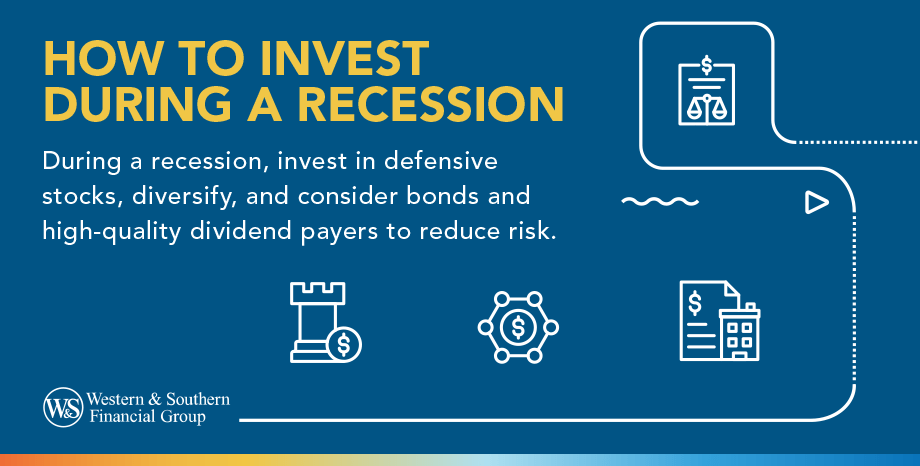Table of Contents
Table of Contents


Key Takeaways
- Investing during a recession means buying undervalued assets for potential gains when the economy rebounds.
- Choose assets like government bonds, utility stocks, healthcare, and consumer staples for stability and security during economic downturns.
- Diversifying investments across asset classes and industries mitigates risks and protects against significant losses.
- Economic downturns are natural, so maintain a long-term perspective to avoid panic selling and benefit from market recoveries.
- Personalized financial advice helps tailor your investment strategy to your specific situation and goals, ensuring informed decisions during a recession.
What Does It Mean to Invest During a Recession?
Investing during a recession involves putting money into investments such as stocks, bonds, or real estate while the economy is in a downturn. Despite the challenges they bring, recessions present unique opportunities for investors. When investing during a recession, investors look for undervalued assets affected by the economic downturn. The goal is to buy low and hold until the economy recovers for potential significant gains.
Importance of Recession-Proof Investing
Recession-proof investing means choosing assets likely to remain stable or grow in value during economic downturns. This strategy is essential because it can help protect your investments from significant losses and create a more robust financial base.1
Here are a few reasons why recession-proof investing is crucial:
- Stability and Security: Consider recession-proof types of investments like government bonds, utility stocks, healthcare, and consumer staples.
- Opportunities for Growth: Recessions allow savvy investors to buy high-quality companies at lower prices, potentially leading to substantial gains when the economy recovers.
- Diversification: Spreading your money across different assets and industries to lower risk is wise to protect your investments during tough economic times.
- Long-Term Benefits: Investing with a recession-proof mindset means making smart choices during downturns to thrive in the long run, as the economy historically rebounds and offers significant returns to wise investors.
Investing during a recession involves strategically purchasing undervalued assets while focusing on recession-proof investments to help ensure stability and growth. Adopting this approach can protect your financial future and allow you to exploit opportunities during economic downturns.
Understanding Recessions
What is a Recession?
A recession is when the economy slows, usually marked by decreased consumer spending and increased unemployment.2 Businesses may see lower profits, and the stock market often drops. Recessions are a natural part of the economic cycle. They happen periodically and are usually followed by periods of economic growth.
Opportunities for Buying Undervalued Assets
Many assets, like stocks and real estate, can become undervalued during a recession. This means prices drop below their worth due to widespread fear and selling. This allows savvy investors to buy these assets at lower prices.
- Stock Market: The stock market often goes down during a recession, providing an opportunity to buy lower-priced shares in solid companies that may increase in value as the economy improves.
- Real Estate: Consider buying real estate during a recession when prices are low to potentially make significant gains, as property values usually increase over time.
Potential for High Returns in Recovery Periods
After a recession, the economy typically enters a recovery period. This presents excellent opportunities for high returns on investments.
- Stock Market Rebound: Low-price stocks can see substantial price increases during recovery, potentially becoming more valuable.
- Rising Property Values: Properties bought at lower prices during a recession can appreciate significantly as the economy recovers, providing a solid return on investment.
Remember: Maintaining a balanced investment strategy and diversifying your investments is crucial to managing risk. Consult a financial advisor to create a plan tailored to your circumstances and goals.
Steps to Invest in a Recession
Investing during a recession can feel daunting, but navigating the downturn effectively with the right strategies is possible. Here are some steps to consider:
- Review and Adjust Your Portfolio: Review investments and diversify with bonds and essential sector stocks.
- Focus on Quality Investments: When investing in stocks, look for companies with solid balance sheets, a history of performing well in challenging economic activity, and regular dividend-stock payments. These companies, such as blue-chip stocks, tend to be more stable during recessions.
- Keep an Emergency Fund: It's crucial to have readily available liquid assets. Aim to have an emergency fund covering at least six months of expenses to avoid selling investments at a loss if you need quick cash.
- Invest Regularly: Stick to a regular investment schedule, known as dollar-cost averaging, to lower the overall cost per share over time.
- Consider Defensive Stocks: Defensive stocks come from sectors less affected by economic downturns, like consumer staples, healthcare, and utilities. They help provide essential services and products, maintaining steady earnings even during recessions.
- Stay Informed but Avoid Panic: Remember to keep up with financial news and understand how the economy evolves. Avoid making impulsive decisions based on market volatility. Long-term investments typically recover from short-term downturns.
- Rebalance Your Portfolio: Some investments may perform better or worse than others during a recession, so your portfolio balance can shift. Rebalancing helps ensure your investments align with your risk tolerance and financial goals.
- Seek Professional Advice: Consult a financial advisor if you need clarification on making investment decisions during a recession. They can help provide personalized advice that suits your financial situation and goals.
- Look for Opportunities: Recessions can also present opportunities to buy quality investments at lower prices. If you have extra money, consider investing in growth stocks or sectors priced lower than their value or likely to improve soon.
- Maintain a Long-Term Perspective: Investing is a long-term journey. While recessions are challenging, markets historically recover and grow over time. Focus on your long-term goals instead of short-term market changes.
Following these steps, you can make informed investment decisions that help protect and grow your wealth even during a recession.
Strategically allocate assets to withstand recessions and position yourself for future growth. Invest In My Future
Investment Strategies
Investing is like building a house. To help ensure financial stability, you need a solid foundation, suitable materials, and a thoughtful plan. Here are some investment strategies for building a robust investment portfolio.
Diversification to Mitigate Risk
Diversification means putting only some of your eggs in one basket. Remember to spread your money across different investments to lower the risk of losing everything if one investment doesn't do well. Mix stocks, bonds, real estate, and other assets to protect yourself from market downturn.
Defensive Stocks and Sectors to Consider
Defensive stocks are shares in companies that tend to do well no matter what the economy is doing, such as utilities, healthcare, and consumer staples. Adding defensive stocks to your investment portfolio can help keep it steady when the market gets unpredictable.
Bonds and Other Fixed-Income Investments
Bonds are loans to a company or government that pay regular interest and return the original amount. They are safer than stocks, offering steady income and lower risk. Other fixed-income investments like CDs and Treasury securities help provide stability and income, even during a volatile stock market.
Real Estate Opportunities
Real estate is a great way to diversify investments. You can earn rental income and potential value appreciation over time. Real estate investment trusts (REITs) are another option for investing without owning property. REITs pool money from multiple investors to purchase and manage real estate, and you earn a share of the profits.
Dollar-Cost Averaging
Dollar-cost averaging is a way to invest money regularly, regardless of the stock market. This approach helps reduce the impact of market ups and downs by spreading your investments over time.3
Combining these strategies allows you to build a well-rounded investment portfolio that balances risk and reward. Remember, the key to successful investing is not just picking the right stocks or timing the market perfectly but creating a plan that works for you and sticking to it.
Common Pitfalls to Avoid
Investing during a recession can be tricky, but it also presents opportunities. Knowing what to avoid can help protect your investments and set you up for success when the economy recovers. Here are some common pitfalls to steer clear of:
- Panic Selling: When the market drops, it's easy to panic and sell. However, consider holding onto your investments for the long term instead.
- Ignoring Your Financial Plan: During a recession, sticking to your financial plan, especially for long-term goals like retirement, is crucial. Consulting with a financial advisor can help you stay on track.
- Overlooking Cash Reserves: It is essential to have an emergency fund for unexpected expenses and economic downturns. Only invest some of your cash reserves for potential gains, and keep enough liquid assets for flexibility.
- Chasing High-Risk Investments: During a recession, it's better to focus on stable, low-risk investments or blue-chip stocks with a history of weathering economic storms rather than high-risk investments.
- Neglecting Diversification: It's not wise to put all your eggs in one basket during a recession. Diversify your portfolio across different sectors and asset classes to spread risk and minimize the impact of a downturn.
- Forgetting About Inflation: Consider assets like stocks, real estate, or inflation-protected securities to keep up with or outpace inflation.
- Timing the Market: Timing the market is difficult, especially during a recession, so investing regularly through dollar-cost averaging is a better strategy.
- Overreacting to Media Hype: Remember to focus on long-term trends and your financial goals instead of daily market news.
- Neglecting to Rebalance Your Portfolio: To maintain your desired asset allocation, consider periodically reviewing and rebalancing your investments. This may involve selling well-performing assets and buying underperforming ones.
- Failing to Take Advantage of Tax Strategies: During recessions, you can use tax-efficient investing strategies like tax-loss harvesting. Consult a tax advisor for personalized advice.
By avoiding these common pitfalls, you can better navigate the uncertain waters of a recession and position yourself for financial stability and growth when the economy recovers.
Tips & Key Considerations
Investing can be challenging during a recession but presents some unique opportunities. Here are some tips and essential things to think about:
- Stay Calm and Patient. Recessions can be stressful, but panicking often leads to poor decisions. Staying calm and avoiding making impulsive changes to your investment strategy is essential. Remember, economic downturns are a normal part of the business cycle.
- Diversify Your Portfolio: Diversification is crucial, especially during economic downturns. Spread your investments across different assets like stocks, bonds, real estate, and commodities to reduce risk, as not all investments react the same to market conditions.
- Focus on Quality: Invest in high-quality companies with solid balance sheets and stable cash flows during a recession. These companies are more likely to stay strong during tough economic times and bounce back quickly when the economy improves.
- Look for Bargains: Lower stock prices during recessions create opportunities to buy quality individual stocks at a discount. Look for oversold companies with solid fundamentals for potential gains when the market rebounds.
- Maintain a Long-Term Perspective: When investing, keep a long-term mindset. Avoid trying to time the market and stay focused on your long-term financial goals despite short-term market changes.
- Review and Rebalance Your Portfolio: Review your portfolio regularly to help ensure it aligns with your risk tolerance and investment goals. Rebalancing might be necessary after significant market movements.
- Increase Your Emergency Fund: A robust emergency fund is more important than ever during a recession. Help ensure you have enough cash to cover at least six months of living expenses. This can help provide a safety net if you face unexpected financial challenges.
- Consider Defensive Stocks: During tough times, defensive stocks in healthcare, utilities, and consumer staples tend to stay strong. These companies offer essential goods and services that people always need, regardless of the economy.
- Stay Informed but Avoid Overacting: Stay updated on economic news and market trends, but avoid making hasty decisions based on short-term information. Too much focus on daily market movements can lead to anxiety and rash decisions.
- Consult a Financial Advisor: If you need help investing during a recession, you should talk to a financial advisor. They can give you personalized advice and help you make a plan that fits your financial goals and how much risk you're comfortable with.
Investing during a recession requires a balanced approach, combining caution with strategic opportunities. By staying well-informed and keeping a long-term perspective, you can handle the challenges and take advantage of the opportunities during economic downturns.
Conclusion
Planning carefully, making informed decisions, staying proactive, seeking expert advice, and learning are essential when investing during a recession. Smart investment choices can help secure financial stability and uncover growth opportunities.
Prepare for the future by investing in assets designed to weather economic storms. Invest In My Future
Frequently Asked Questions
Is it a good idea to invest during a recession?
Investing during a recession can be wise with a long-term perspective. Stock prices are often lower, presenting opportunities to buy quality assets at a discount. However, having a solid financial plan and preparing for market volatility is important.
How long do recessions last?
Recessions typically last between six months and a year, though some can be shorter or longer. The duration depends on government policies, economic conditions, and global events.
Which investment is better in a recession?
During a recession, investing in government bonds is often considered safer due to their stability and lower risk than stocks. While stocks can offer higher returns, they are more volatile and can suffer significant losses in a downturn.
Sources
- Best Practices For Effective Portfolio Diversification. https://www.forbes.com/sites/forbesfinancecouncil/2024/03/25/best-practices-for-effective-portfolio-diversification/?sh=5e35f9eb2dd5.
- Business Cycle Dating. https://www.nber.org/research/business-cycle-dating.
- Dollar-Cost Averaging: Pros and Cons. https://www.investopedia.com/articles/forex/052815/pros-cons-dollar-cost-averaging.asp.
























